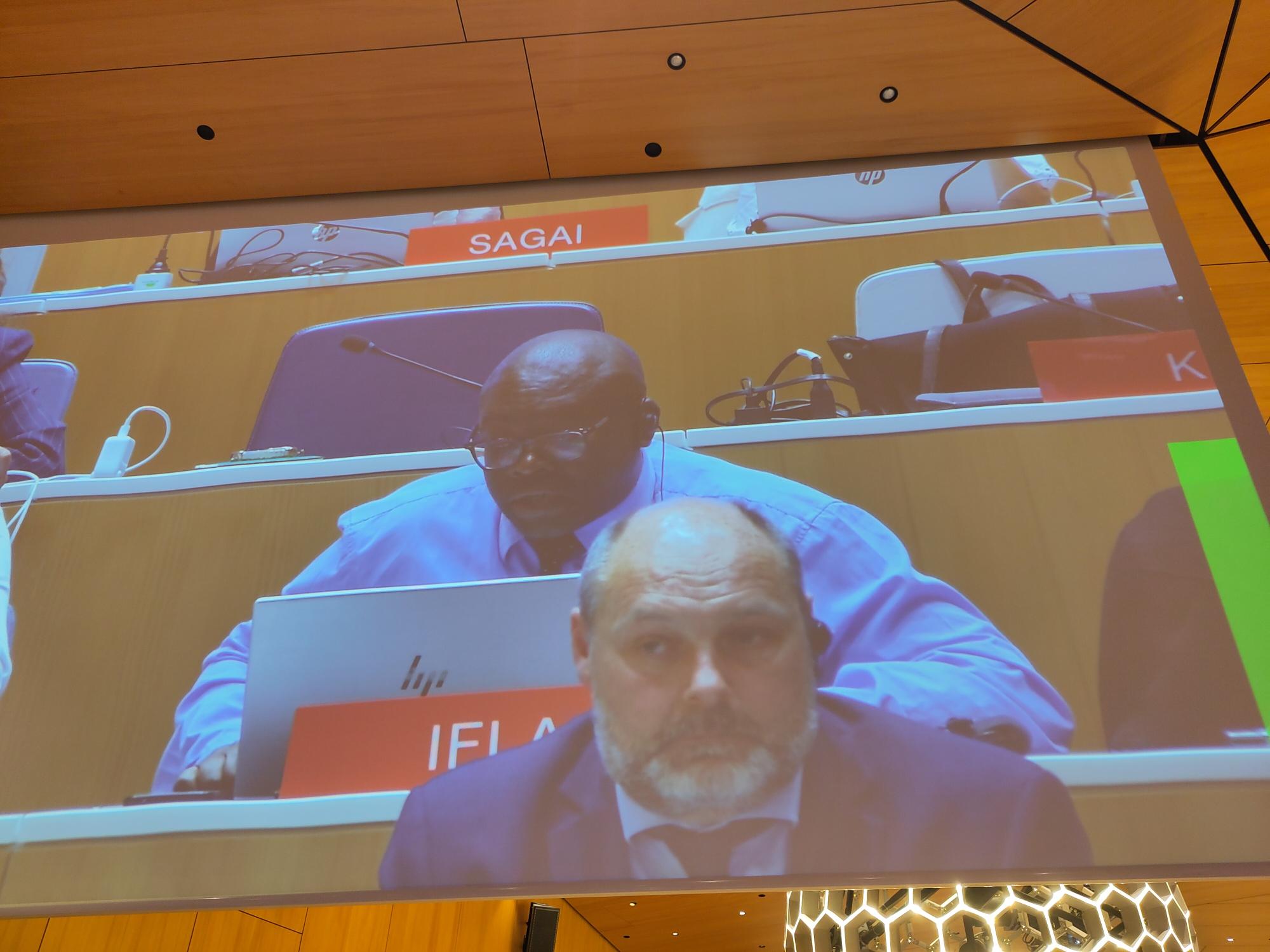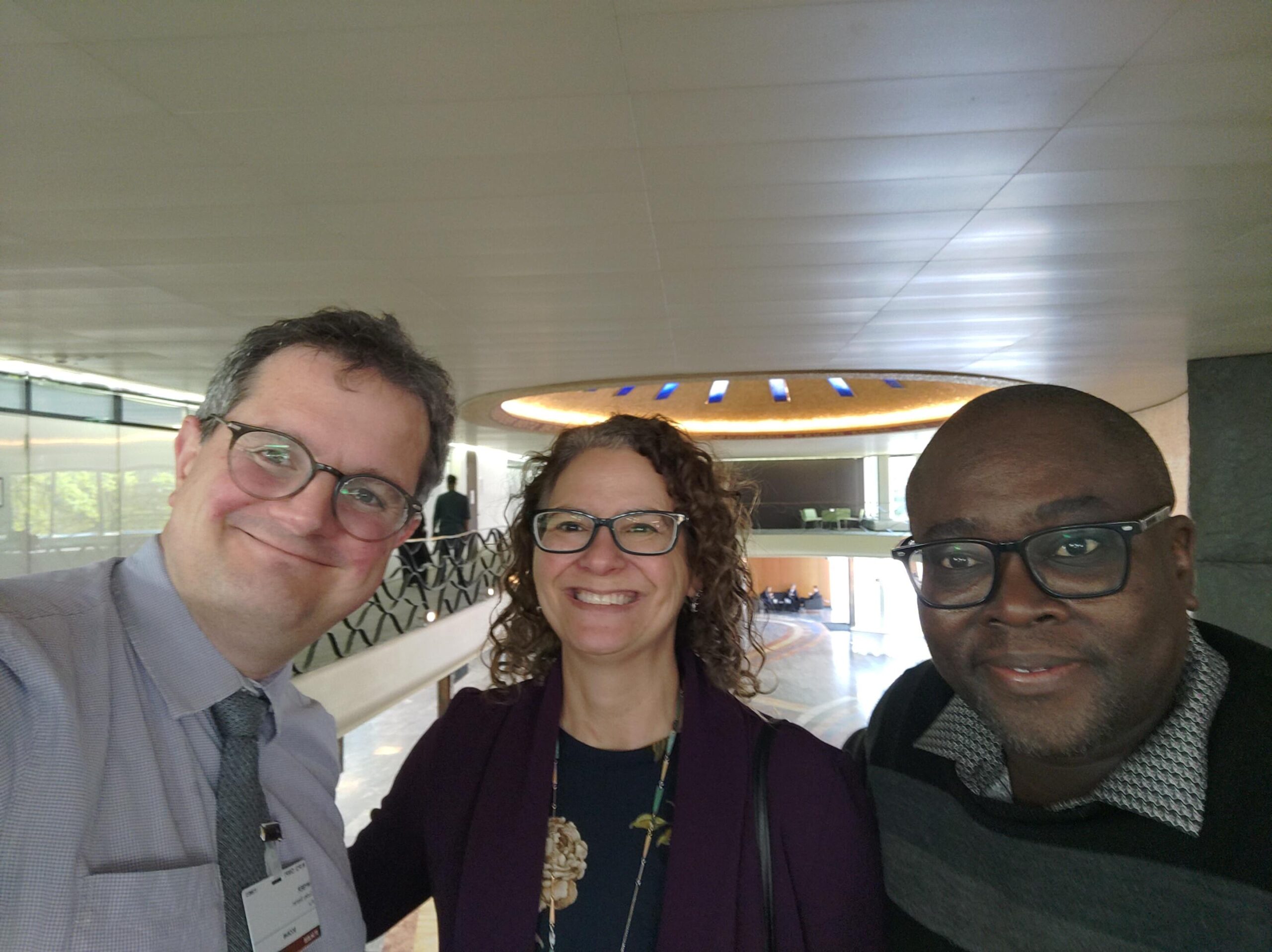More process than progress at SCCR46, but momentum grows for change
16 April 2025
A week of engagement at the World Intellectual Property Organization’s (WIPO) Standing Committee on Copyright and Related Rights (SCCR) saw valuable engagement with delegates, but a gear-shift in work on limitations and exceptions will need to wait for the next meeting.
IFLA’s active participation in WIPO SCCR is driven by the fact that it offers the primary international space for talking about what libraries need from the global copyright system.
As highlighted in our article ahead of the meeting, WIPO is the organisation that produced the Marrakesh Treaty, and is uniquely placed to provide both a catalyst for reform at national level, and to offer the guarantees necessary for cross-border collaborations.
Crucially, such steps at WIPO would simply serve to bring all countries up to the level of those which have already acted to ensure that libraries can fulfil their potential to support research, education and cultural participation, avoiding the worst unintended consequences of copyright laws.

IFLA’s delegation was led by Sara Benson, and included Rodney Malesi (Kenya, and a member of IFLA’s Advisory Committee on Copyright and other Legal Matters) and Anthony Kakooza (Uganda). Rodney and Anthony’s participation was made possible by a grant from American University, Washington.
Momentum for change
Going into the meetings in Geneva, there had been renewed energy amongst Member States who have traditionally been supportive of the needs of libraries and their users. Following years of work simply to produce studies, an action plan was again on the table.
These were aligned with the mandate given to the Committee back in 2012 to work towards a legal instrument focused on limitations and exceptions to copyright. This should cover libraries and archives, education and research, and persons with disabilities other than those covered by the Marrakesh Treaty.
This work had long been held up by countries unwilling to fulfil this mandate – given by the WIPO General Assembly (itself made up of Member States) – due to a fear of agreeing Treaties. Such ‘hard’ law is seen by some as forcing countries to make difficult domestic reforms, or – more cynically – as leading to misapplication of laws by developing countries. Neither argument is strong – or even fair.
Nonetheless, in recent years, we have seen a growing readiness to move towards consideration of high-level principles and objectives that should apply when defining limitations and exceptions. In this, the African Group of countries has been particularly active, promoting a workplan that, with amendments, was agreed by the Committee.
Potential to deliver, a duty to act
With an active new Chair in place – Vanessa Cohen of Costa Rica – as well as strong engagement by IFLA, as well as other library, archive and museum representatives as well as the wider Access to Knowledge coalition, the focus was on making sure that concrete work began. While we certainly have a preference for international law, perhaps more important still is that WIPO realises its potential to have any sort of positive impact in the world.
Opposing this, alongside the standard voices from organisations implying that not everyone has a right to the same level of library services, or that library activity is similar to piracy, there remained disagreements about the end goal of this work.

Doubtless influenced by wider political developments in the world, some countries continued to try to prevent any progress on the limitations and exceptions agenda, claiming the risk of it leading to a Treaty. This is despite the workplan on the table leaving the end-goal of work open. Leaving decisions about this to a later date is a necessary compromise, given disagreement about what the final result could be, and reflects the original 2012 mandate.
In effect, while the efforts of the African Group and many others to start work represent a faithful implementation of the Committee’s mandate, those blocking it are also out of line with their own commitments. Crucially, this also means that WIPO as a whole is failing to fulfil both its potential and its duty to the world.
Late frustration, but an opening remains
Despite the positive efforts of those working to implement the Committee’s mandate, in a session that lasted until 3:15am on Saturday morning, it only proved possible in the Chair’s Conclusions to agree on a mandate for the Chair to work with members to establish a way forwards from the next meeting, later this year.
While the form of these next steps is left somewhat open, this is less than we could have hoped for. The possibilities for substantive debate at the next session will certainly be more limited than they would have been with a different conclusion, despite the hard and positive efforts of the Chair. In effect, the focus remains on process, not progress.
Overall, the results of the discussions on limitations and exceptions mean that between now and the next meeting, we will continue to need to work with the Chair and like-minded countries to underline the need for action and support debate with evidence and experience.
Without this, WIPO will continue to fail to fulfil its potential to make positive change happen, and contribute to wider UN system goals around preservation of heritage (notably in the face of climate change), education and research.
Meanwhile, in other news…
Elsewhere, there was also limited progress on the proposed Treaty on Broadcasting, where Member States are increasingly aware of the limitations of an instrument focused on an increasingly obsolete technology. It has also been welcome to see growing calls for clear protections for the work of libraries through stronger exceptions.
This too will be on the agenda of the next meeting of SCCR, where we will continue to argue for any Treaty here to reflect the needs of libraries with collections of broadcast material.
One item that won’t be there is Public Lending Right (PLR), on which work was formally closed. This is welcome news, given that original work here was narrowly and uncritically focused on promoting PLR schemes in developing countries, something that IFLA opposes. While the report already commissioned by WIPO here may be useful, we had argued strongly that the topic had no place on the agenda in Geneva.
In addition questions around how to achieve the goals of copyright in the digital environment are of high interest, with both proposals for general work around this topic, and an information session focused on Generative AI. Such work provides a useful way of maintaining the relevance of SCCR, but of course needs to reflect that not every problem needs a copyright solution.
A call to action
As underlined above, the priority now is to ensure that Member States continue to appreciate the potential that WIPO has to make a positive difference not just for libraries and their users, but for the wider public policy goals that libraries help to achieve.
This applies as much to those countries which are already supportive, and who need to be thanked for their help, as well as those who have been slower to make progress. In this, the voice of library associations and professionals on the ground will be essential.
We will therefore be sharing information and ideas with members, and welcome any other expressions of interest to be involved in work here.